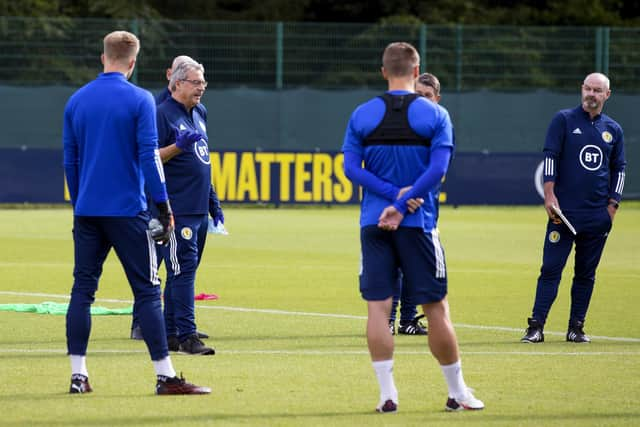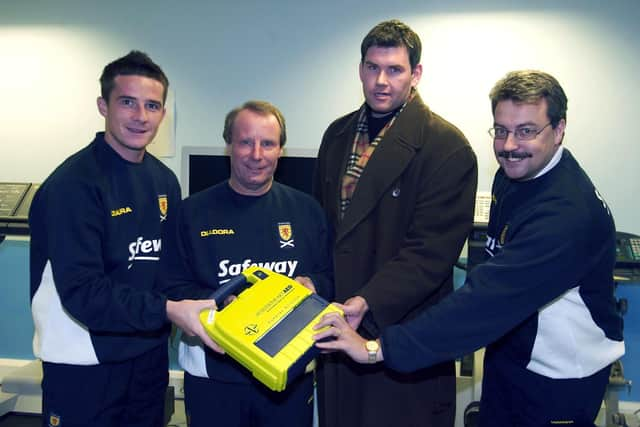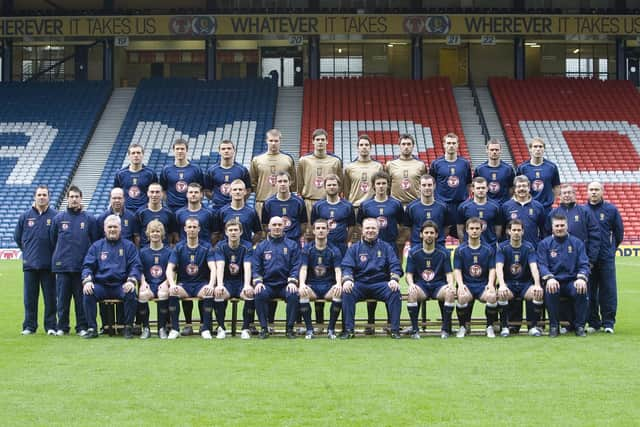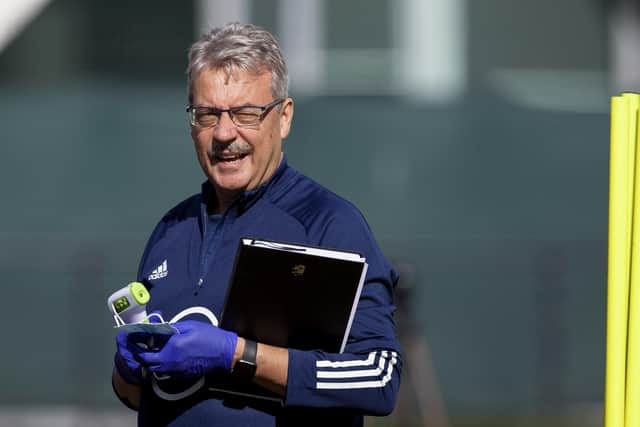Dr John MacLean's front seat to Scotland, trivial pursuit v Walter Smith, Serbia realisation, dementia study
Dr John MacLean, the Scotland national team doctor until November 2021, remembers a Friday evening in October 2006 fondly. The eve of a famous day in Mount Florida, the most famous for Scotland until the recent win over Spain. Gary Caldwell’s stab past Gregory Coupet to land the country a historic win in what was another ‘what could have been' qualification story. It forms part of his fond and warm memories of Walter Smith. A genius, a great man but a competitor.
“When Walter took over from Berti [Vogts] there was a wee bit of a dip at that point and part of Walter’s genius was having Ally McCoist and Tommy Burns both because of what they did on the training field but equally what they did off the training field,” MacLean told The Scotsman. “That was a very enjoyable time. Walter was a great person. He was very competitive. We would sit and play trivial pursuit and the medical team would play the coaching team and, as you would imagine, the medical team would win the vast majority of the games.”
Advertisement
Hide AdAdvertisement
Hide AdOn that particular Friday night, the eve of welcoming the World Cup finalists to Hampden Park, did Smith and the coaches eventually defeat MacLean and co.? “Let's say an honourable draw!”.
52 of 55 UEFA countries
As he did that evening, MacLean had a front row seat to some of the best, historic and infamous moments in Scotland's international history, starting with the Scottish FA in 1983 through until qualification for Euro 2020, the tournament itself, before stepping aside after the 2-0 win over Denmark in 2021. There was the 1987 FIFA World Youth Championship in Chile, won by a revered Yugoslavia side, and the 1989 Under-16 World Cup final at Hampden Park against Saudi Arabia's mustachioed teenagers. European Championships, World Cups, nine permanent managers, a variety of countries, countless players but many, many great memories.
MacLean, who had spells working at both Celtic and Rangers, vividly remembers the Kirin Cup triumph under Smith when “Scotland got battered nothing each” by hosts Japan “on a West of Scotland Friday night, absolutely pouring with rain”, “just walking up the stairs and feeling breathless with the altitude” of Mexico City and the “very little crowd in a very picturesque” San Marino. He estimates that he’s been to 52 of 55 UEFA countries, had a walk in most, but if he went back he “wouldn’t know half of them”.
"It is a very different person being a football doctor than being a doctor doctor, hospital GP or whatever," he said. “It is a very different environment. You are away from your family, you are living in a hotel, going to training, going to a match, on a plane, coming back, seeing very little.”


One night in Belgrade
Seeing little of the country, maybe, but seeing plenty in a football context. MacLean can claim to have been one of a handful of lucky non-playing Scots to have been present on that November night in 2020 in Belgrade’s Marakana as Scotland defeated Serbia on penalties thanks to David Marshall's save from Aleksandar Mitrovic to finally return to the table of international football rather than having their face pressed against the window. It was “most surreal”.
“A difficult environment to be in, Covid times, no crowd. Scoring a goal, losing a goal in stoppage time. Going into extra time with a dread of were we able to rise again for another 30 minutes and fearing they might dominate. Getting through extra time and the unbelievable drama of Marsh saving the penalty. The feeling of what do you do next. I’m a celebrator and I hate to say, sometimes a bit of an over celebrator. Do you run on the pitch? Or hug the manager? Or medical colleagues? I found myself running on the pitch and half way thinking ‘should I be doing this? I don’t care, I’m doing it anyway’."
Footage is there for everyone to see of MacLean amongst the celebrations on the pitch, in the box, hugging Ryan Jack. Even a pain-staking wait, “sitting with the two players desperate for them to pee to get back into the dressing room”, didn't dull the elation, what it meant and what came next.


"The joy of coming home, seeing the texts and photos and wee video clips of people in their house that night,” he said. “The players saw that, we had two other games after that, the joy in peoples’ faces during a difficult time when people had lost loved ones and life was really difficult. The joy that football can bring. Walking out for that first game at Hampden against Czech Republic. A half-full Hampden was still a fantastic atmosphere and knowing at that time it was going to be my final major tournament. The bad moments were all the disappointment but that’s football and elite sport. The good moments massively outweighed the bad ones.”
Advertisement
Hide AdAdvertisement
Hide AdIt is clear that MacLean, who name checks his predecessor Stewart Hillis as his “mentor in life”, continues to hold huge admiration for Craig Brown, “a massive influence on me personally and is still a friend”, who he worked with at Clyde before they teamed up for Scotland. And he was forthcoming with one of his “biggest regrets” when the team were close but didn't get over the line under Gordon Strachan for the 2016 European Championships in France.
Doctor, physios and sport scientists
Now, perhaps it should be cleared up, what exactly is the role of the doctor of a national team and what separates them from the physios and sports scientists?


“I’d look at it now with the extended medical staff," MacLean explained. “We all have our areas of particular expertise. Illness would be the team doctor. Things like anti-doping, concussion management, head injury assessment that would be the team doctor. The muscular and skeletal side would be a joint assessment between the two but the physios would tend to take the lead on that. With all due respect, good physios are better than me at skeletal management, they do it day in, day out. The physios and sport scientists will liaise around warm-ups and if you have got players, more so at club level, that are going through rehab, the physios will start it and the sports scientists will take that on. It’s pretty much a team effort. We are all there to make each other’s jobs a bit easier and most importantly support the players and get 16 fit players available to the manager on the pitch.”
That is barely scratching the surface. The SFA’s head of performance Graeme Jones has removed some of the burden from the team doctor, liaising with clubs of the national team's players in the build-up to international breaks but it ramps up on the weekend of the camp, the most difficult period being the “Saturday evening, Sunday morning, between them playing and meeting up Sunday or Monday”. It’s between that time of engaging with clubs over the fitness of players and the squad turning up for squad HQ for their assessment, whereby the readiness of the individuals within the squad is ascertained, when they can train, are they capable of playing two or three games in a week and are there any players who would benefit from returning to their club. On the flipside, there is contact from clubs if a player takes a knock in a Scotland jersey. The national team’s staff are aided by injury system, ScribePro, the “baby” of the main doctor Jonny Gordon, providing a tool to communicate to physios and medical staff at clubs.
Club v country balance
The relationship between national team and clubs is something MacLean takes great pride in having worked alongside Jones in building the trust which is required for a smooth transition during international breaks. But also the relationship built up over time with the different managers and caretakers. With the stakes huge, it is easy to imagine some difficult moments between doubts over a player’s fitness from the doctor and medical team and the desire from the management for that player to feature.
"It is about building up a relationship and trust with a manager,” MacLean said. “All we can do is give the manager advice. It is very, very, very, and I use lots of verys, few occasions where there has been any level of disagreement. It’s based on a bit of trust and also managers who have managed international teams have all managed club teams and they know there are occasions when they may have played players where it has maybe not worked out, they’ve not lasted in the game. For all right and wrong reasons, they’ve done that. When they get to be an international manager, in my experience, they are all well rounded in football. They would almost never take a chance with a player, A) because of the player’s welfare and B) because if something happens, you’ve ruined the relationship with the player’s club. And if a club doesn’t want a player to come it is very easy for that player not to come.
“The players want to come and play for Scotland. There are no players in this squad who don’t want to be there. Everybody is desperate to come. That is partly down to the manager’s relationship with the players, partly down to Graeme’s relationship with the players and the rest of the backroom staff and it is partly down to Andy [Robertson], Callum [McGregor], John McGinn as well because they make the environment in the squad one that people want to come to. We’ve all got wives and families and people at home we’re not with for those ten days. In some ways it is harder because we are not playing. My wife Maureen has been hugely supportive over the years and has put up with me missing the vast majority of birthdays and anniversaries. Our daughter gets married in the summer and if I was still with the team I’d be away for two weeks before she gets married. That’s quite a big ask for your life."


The chef and McDonald’s
The role has developed significantly across MacLean’s time with the SFA. Not just that of the doctor but the way the game itself progressed and the growing number of support staff with it, as football embraced sport science and analytics in search of increased professionalism and marginal gains with one particular individual a favourite of the players. A far cry from memories of when the management team and accompanying staff consisted of Craig Brown, a coach, goalkeeping coach, two physios and a doctor.
Advertisement
Hide AdAdvertisement
Hide Ad“That was it,” MacLean remembered. “There wasn’t a kitman, there wasn't a media person, no sports science, no logistics. Craig did all the press stuff himself. The biggest change is the increase in size and roles and diversity of the backroom staff. If you ask the players who is the most important member of staff outwith the coaches, it would be the chef. That’s a relatively recent introduction. It’s not just about good nutrition but it’s about being in a country in certain parts of Europe where perhaps the facilities are not as good and the food is not as good.
"Without naming the country we very nearly went to McDonald’s one day to feed the players because we felt that even if it is a frozen McChicken sandwich, it is at least going to be defrosted and cooked and we’d probably be safe because the food in the hotel was terrible. That is an extension of extra docs, extra physios, sport scientists, analysis coming in, chefs coming in. All of that has been a huge difference.”
Role in dementia research
While MacLean has taken a back seat when it comes to the Scotland international team he remains a key figure with the Hampden Sports Clinic and is on UEFA’s medical committee and helped play an important role during Covid with Cignpost Diagnostics and its testing of teams, including the national team. Scotland may not have reached the World Cup in Qatar last year but MacLean represented the nation as part of a team to deliver training to physios and pitch side help including head injuries, resuscitation, seizures and anaphylaxis. He and Scotland have been at the forefront of research and education which has spread far and wide, whether it be first-aid courses or head injury management, Scotland being the first country in the world to have a set of concussion guidelines for grassroots sport. Then there is dementia. MacLean, the SFA and the Hampden Sports Clinic discovered through a study that “your risk of developing dementia was three and a half times higher if you were a former professional footballer”. Following on from heading guidelines introduced in 2020 for kids from six to 17, which stated that heading should not be introduced until the 12s age group and even then seen as a low priority, the landmark decision was taken in November 2021 for heading to be limited at professional level and that training exercises which could involve repeated heading should not take place the day before and day after a game.
“There is no evidence to suggest that heading per say is definitely the cause,” MacLean said. “Heading or head injury? We are still not sure. If we were to do the big study which starts today and monitors how often people head the ball and then see who gets dementia it will take 40 years, from a 20-year-old to a 60-year-old. We can’t wait on that. We decided to be pragmatic. Where we did the right thing is we looked at what would be sensible guidelines based on the little science we knew. The things we thought about were how often do young people head the ball, so we did a survey with UEFA to find out how often that happened and the answer is very little. If they are not doing it that much then why do we allow them to do it in training. We made a conscious decision to reduce the overall heading burden, nothing in training in primary school, very gradual introduction because we appreciate heading is going to come into the game later on.
"We took a bit of a pause. We asked the players and the coaches and asked for their feedback, tweaking the guidelines based on what they would say. We didn’t want to say ‘here is an edict coming from the top, this is what you MUST do’. We got the coaches on board and said ‘the evidence is perhaps if you repeatedly head the ball there is temporary effect on your brain function which lasts maybe 24 hours, one of the things we would like you to do is given they will be heading on a match day, can we not do drills which involve repetitive heading on match day minus-one’. That was based on science. There was a question from coaches, they like to do set plays on match day minus-one but because we did that, tweaked things and went back to coaches the feedback from all of them was thanks for doing something and taking our feedback on board, for being what we think is sensible rather than draconian. There’s been no negative feedback from the media, coaches and players. I think the really important point to emphasise is the path we went on, in parallel with dealing with the head injury side, the concussion guidelines and now we have concussions subs. Scotland were, through UEFA, FIFA and IFAB, part of bringing that to fruition."
From the 80s through the 90s, 00s, 10s and into the 20s, MacLean was the man in the background with a front row seat to Scotland’s successes, disappointments and glorious failures. Even if he has taken a step back, he is still forging an indelible mark on the Scottish game.
John MacLean, through his work with Hampden Sports Clinic, has linked up with Cignpost Diagnostics to provide advice and input regarding diagnostic testing programmes for employers which can involve health and fitness testing.
Comments
Want to join the conversation? Please or to comment on this article.